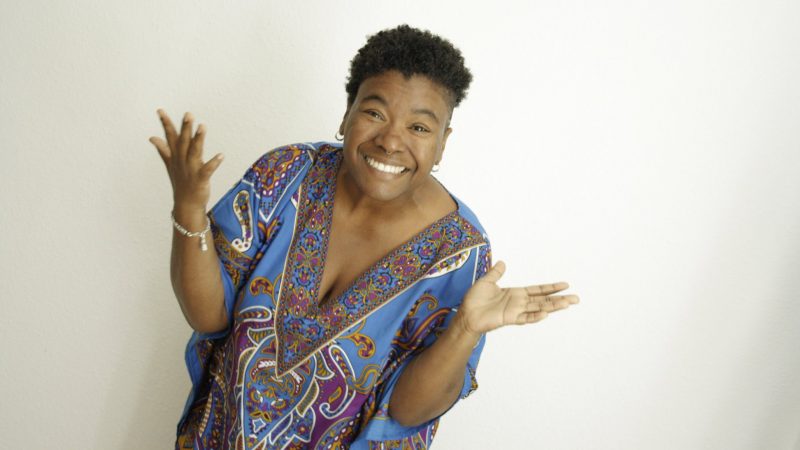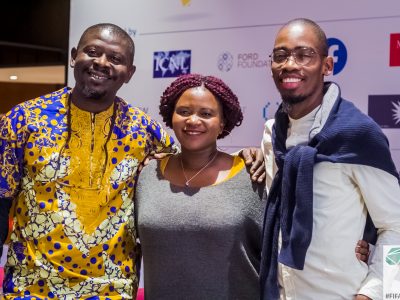
Sandra Abd’Allah-Alvarez. Photo provided by the interviewee. Used with permission.
Sandra Abd’Allah-Alvarez Ramírez is a psychologist and communicator born and raised in Havana, Cuba.
Her activism began in 2006, when she's started the blog Negra cubana tenía que ser (“It had to be a black Cuban woman!”), where she writes about racism, homophobia, and migration, drawing a lot–but not only–from her own personal experiences.
In the past 12 years, Sandra's life has taken more than a few exciting turns. She created the Directorio de Afro-Cubanas (Index of Afrocuban Women), a database of Cuban women of African descent that have made significant contributions to the country's society.
And she's left Cuba to live in Hamburg, in Germany, to marry the woman she loved.
Personal blogs also seem to have a lost a bit of momentum in the past decade, but, for Sandra, Negra cubana tenía que ser helps her to keep her activism alive, as well as her connections to her homeland.
Another way she has found to keep the flame of her activism burning is writing for Global Voices, which she joined in 2014.
In this conversation, Sandra talks about inequality in both Cuba and German, about her experience and the multiple identities that define the many identities that exchange in countries like the Cuba where she is from, and the Germany she lives in today.
GV: What are the fundamental differences you see between Cuba and Germany when it comes to race and racism?
SA: Creo que en Cuba la gente no tiene miedo ni siente vergüenza por reconocerse racista, o por no saber qué pasa fuera de la isla. Si alguien te grita en la calle “negra cochina”, no dejará de haber quien piense que tienen razón. No existe una legislación específica contra el racismo ni la discriminación racial que te ayude a lidiar con ciertos episodios. Todo queda en el ámbito de la “autovictimización”, la “suceptibilidad” y el “complejo”.
En Alemania yo diría que el racismo está íntimamente ligado a la xenofobia. Por eso las personas que no son “blancas”, según lo que significa ser blanco aquí, son percibidas como extranjeras. Diría también que aquí está mal visto ser racista y, aunque probablemente no vivas episodios notables de racismo, sí verás expresiones diversas y constantes de microrracismo. Por lo demás, la discriminación racial no solo está mal vista, sino que hay instrumentos legales para defenderse.
SA: I believe that in Cuba, people aren't afraid or feel ashamed to acknowledge their own racism, or for not knowing what happens outside the island. If someone yells “black pig” in the street, there will always be someone else who will agree with them. There isn't a specific law criminalizing racism or racial discrimination to help you deal with certain situations. Everything remains in the field of “self victimization,” “susceptibility,” and “complex.”
In Germany, I would say that racism is intimately linked to xenophobia. That's why people that aren't “white,” according to what it means to be white here, are perceived as being foreigners. I would also say that, here, racism is frowned upon, and though you may not experience explicit situations of racism, you will see various and constant expressions of micro-racism. Besides, racial discrimination is not only seen as negative, but there are legal ways through which you can defend yourself.
GV: In one of your posts, you say that to be black in Germany is to automatically be labeled an immigrant, regardless of whether you were born in the country or not. What does this mean for the black communities there?
SA: No habiendo nacido aquí solo puedo darte mi visión (sesgada) del asunto: creo que es un reto para la identidad ser una persona negra y haber nacido aquí. La gente negra aquí no la tiene nada fácil. Constantemente tienen que estar explicando que no hablan sino alemán y que no conocen otra cultura que no sea esta.
SA: Not having been born here, I can only give you my (biased) opinion on the matter: I believe that it's a challenge for someone's identity to be born here as a black person. Black people here don't have it at all easy. They constantly have to explain that they do, in fact, speak German and that they don't know any culture other than this one.
GV: What surprised you, and what have you learned, after leaving Cuba?
SA: No esperaba la gran autonomía que gané, ni la posibilidad de relacionarme y aprender de gente muy diversa. Cuba es una isla dentro de una isla, dada su condición de pedazo de tierra en el mar y también por su sistema político.
SA: I didn't expect the amount of autonomy that I've gained, nor the possibility of relating to and learning from such diverse people. Cuba is an island within an island, because of its geographical conditions as a piece of land on the sea, but also because of its political system.
GV: How do both countries compare in terms of sexuality issues?
SA: En Cuba estamos aún en pañales. Aunque se haya hecho mucho, queda muchísimo por hacer. Alemania, como sociedad capitalista, piensa más en los derechos individuales. Por eso aquí, a excepción de la adopción, las personas LGTBTQI gozan de los mismos derechos que el resto de la población.
SA: In Cuba, we are still in our infancy. Even though a lot has been done, there is still much more to do. Germany, as a capitalist society, thinks more about individual rights. So here, with the exception of adoption, LGBTQI people enjoy the same rights as the rest of the population.
GV: Do you forgive Cuba for having made you leave your country to be able to marry the woman you loved?
SA: Sí, claro, fue una decisión personal. Lo que no le perdono es que cinco años después de mi salida aún tengamos que continuar luchando por los derechos de las personas LGBTQI.
SA: Yes, of course, it was a personal decision. What I do not forgive is that even after five years since my departure, we still have to fight for the rights of LGBTQI people.

Original logo of the Index of Afro-Cuban Women. Taken from the project page and used with permission.
GV: And what about matters of gender? Do you see any changes there?
SA: Lamentablemente la respuesta es no. En este artículo denuncio cómo, a pesar de la ley de maternidad tan progresista que tiene Cuba, existen mujeres obligadas a abortar para conservar su trabajo. Ese sector ha construido sus propias maneras de hacer, algunas de ellas al margen o incluso paralelamente de las leyes del país.
SA: Sadly, the answer is no. In this article I talk about how, despite Cuba's progressive maternity leave legislation, many women have to resort to abortions in order to keep their jobs. This sector has built its own ways of doing things, some of them happening outside of the rule of law in the country.
Where did the idea behind the Index of Afro Cuban Women come from?
SA: La necesidad surge de la histórica invisibilidad que ha tenido lugar en Cuba con los aportes de las mujeres afrodescendientes. También se busca acercar a las afrocubanas al público en general. Siempre y cuando sea posible, en las fichas aparecen los datos de contacto de la persona en cuestión.
De alguna manera el Directorio es también mi tributo a estas mujeres y una forma de devolverles lo que ellas han dejado en mí. Honrar, honra.
SA: The need comes from the invisibility of afro-descendant women in Cuba's history. It also seeks to bring Afro-Cuban women closer to the general public. Always and whenever possible, the files show contact details for the person in question.
In some way, the Index is also my tribute to these women and a way to repay them for what they have given me. By giving honor, I honor myself.



